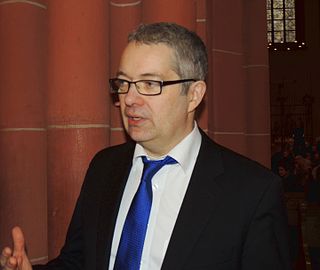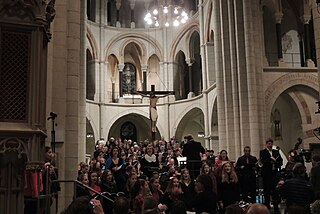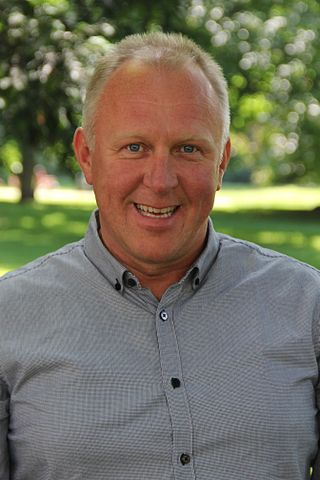Related Research Articles

Lothar Zenetti was a German Catholic theologian, priest, and author of books and poetry. In Frankfurt, he was both a minister for young people and a parish priest. He was also active on radio and television. His songs, for example the popular "Das Weizenkorn muss sterben" and "Segne dieses Kind", appear in both Protestant and Catholic hymnals.

Peter Reulein is a German composer, organ improviser, academic teacher and church musician, from 2000 at the church Liebfrauen in Frankfurt am Main. In 2016 he composed for the Catholic Diocese of Limburg the Franciscan oratorio Laudato si'.

Helmut Alfons Schlegel is a German Franciscan Catholic priest, meditation instructor, author, librettist and songwriter. He is known for writing new spiritual songs, set to music by various composers.

Eugen Eckert is a German social worker, minister, singer-songwriter and academic teacher. He is known for his lyrics for new spiritual songs, and his oratorios and musical plays.

Laudato si' is an oratorio composed in 2016 by Peter Reulein on a libretto by Helmut Schlegel. Subtitled Ein franziskanisches Magnificat, it includes the full Latin text of the Magnificat, expanded by writings of Clare of Assisi, Francis of Assisi and Pope Francis. The composer set it for five soloists, children's choir, Choralschola, mixed choir, symphony orchestra and organ. It was published in 2016 by the Dehm Verlag, and was premiered on 6 November 2016 at the Limburg Cathedral, conducted by the composer.

Patrick Dehm is a German Catholic theologian, supervisor and clinical Gestalt therapist. He and his brother founded the Eugen Dehm foundation, supporting a holistic health concept, in memory of their father.
Advent songs are songs and hymns intended for Advent, the four weeks of preparation for Christmas. Topics of the time of expectation are the hope for a Messiah, prophecies, and the symbolism of light, among others. Several of the songs are part of hymnals such as the German Catholic Gotteslob (GL) and the Protestant Evangelisches Gesangbuch (EG).
TAKT is a group of writers and composers of new songs for use in Christian churches, initiated in 1947. The genre which the members promoted was later called Neues Geistliches Lied. The name is short for TextAutor/innen- und Komponist/innen-Tagung, a name that the group adopted in 1997.
"Herr, segne uns" is a poem in three stanzas by Lothar Zenetti, written in 1971. With a 1972 melody by Karl Fink, it became a Christian hymn of the genre Neues Geistliches Lied (NGL), appearing in German hymnals. It is usually sung at the end of a service before the blessing. The full title is "Herr, segne uns, lass uns dir dankbar sein".

"Gott, der du warst und bist und bleibst" is a Christian hymn with text by Eugen Eckert and a melody by Herbert Heine. It is also known by the title of its refrain, "Wir haben hier keine bleibende Stadt". The song was written in 1993, in the genre Neues Geistliches Lied (NGL). It appears in several regional sections of the German Catholic hymnal Gotteslob, and in other songbooks.

"Meine engen Grenzen" is a Christian poem by Eugen Eckert, written in 1981, and made a hymn of the genre Neues Geistliches Lied with a melody and setting by Winfried Heurich the same year. The song, bringing one's shortcomings and limitations before God and praying for a broader perspective, is part of the common German Protestant and Catholic hymnals, and of other songbooks.

"Der Herr wird dich mit seiner Güte segnen" is a Christian poem by Helmut Schlegel. It became a hymn of the genre Neues Geistliches Lied with a 1998 melody by Thomas Gabriel, part of the German Catholic hymnal Gotteslob.
"Einer ist unser Leben" is a poem in five stanzas, written by Lothar Zenetti in 1973. It became a Christian hymn of the genre Neues Geistliches Lied (NGL) with a 1971 melody by Jean Liesse. The song is part of many hymnals, both Catholic and Protestant, and of songbooks, remaining popular in the 21st century.
"Der am Kreuz ist meine Liebe" is the beginning of Passion hymns in German. One version was written by Johann Mentzer as a translation of the Latin "Amor meus crucifixus est", attributed to Ignatius of Loyola, to the melody of "Werde munter, mein Gemüte". A famous version was written by Friedrich Gottlieb Klopstock, in six stanzas, and first published in 1758. It was associated with the melody used first for "Freue dich, du meine Seele".

"Seht, der Stein ist weggerückt" is an Easter hymn in German with text written by the Catholic priest Lothar Zenetti in 1971. With a 2011 melody by Josef Oestemer, it became a Neues Geistliches Lied (NGL) published in 2013 in the Catholic hymnal Gotteslob, as GL 783 in the regional section for the Diocese of Limburg.
The Ökumenischer Kirchentag 2021 was the third ecumenical convention of lay Christians of different denominations in Germany. It was held in Frankfurt, Hesse from 13 to 16 May 2021. Due to the COVID-19 pandemic, the event happened mostly digitally, with only a few events actually taking place with live audience in Frankfurt.
"Komm, Herr, segne uns" is a Christian hymn in German in four stanzas with text and music by the Protestant pastor Dieter Trautwein, written in 1978. It is a hymn of the genre Neues Geistliches Lied (NGL), appearing in German hymnals of different denominations, including the Protestant Evangelisches Gesangbuch and the Catholic Gotteslob. It begins with the line "Komm Herr, segne uns, dass wir uns nicht trennen".
"Wo ein Mensch Vertrauen gibt" is a Christian hymn with text by Hans-Jürgen Netz, written in 1974, with a melody by Winfried Heurich and Fritz Baltruweit. The song of the genre Neues Geistliches Lied was included in hymnals and songbooks.
References
- 1 2 3 4 5 6 "Winfried Heurich feiert seinen 80. Geburtstag". Diocese of Limburg (in German). 2020. Retrieved 9 February 2021.
- ↑ "Winfried Heurich". Dehm Verlag (in German). 2023. Retrieved 3 May 2023.